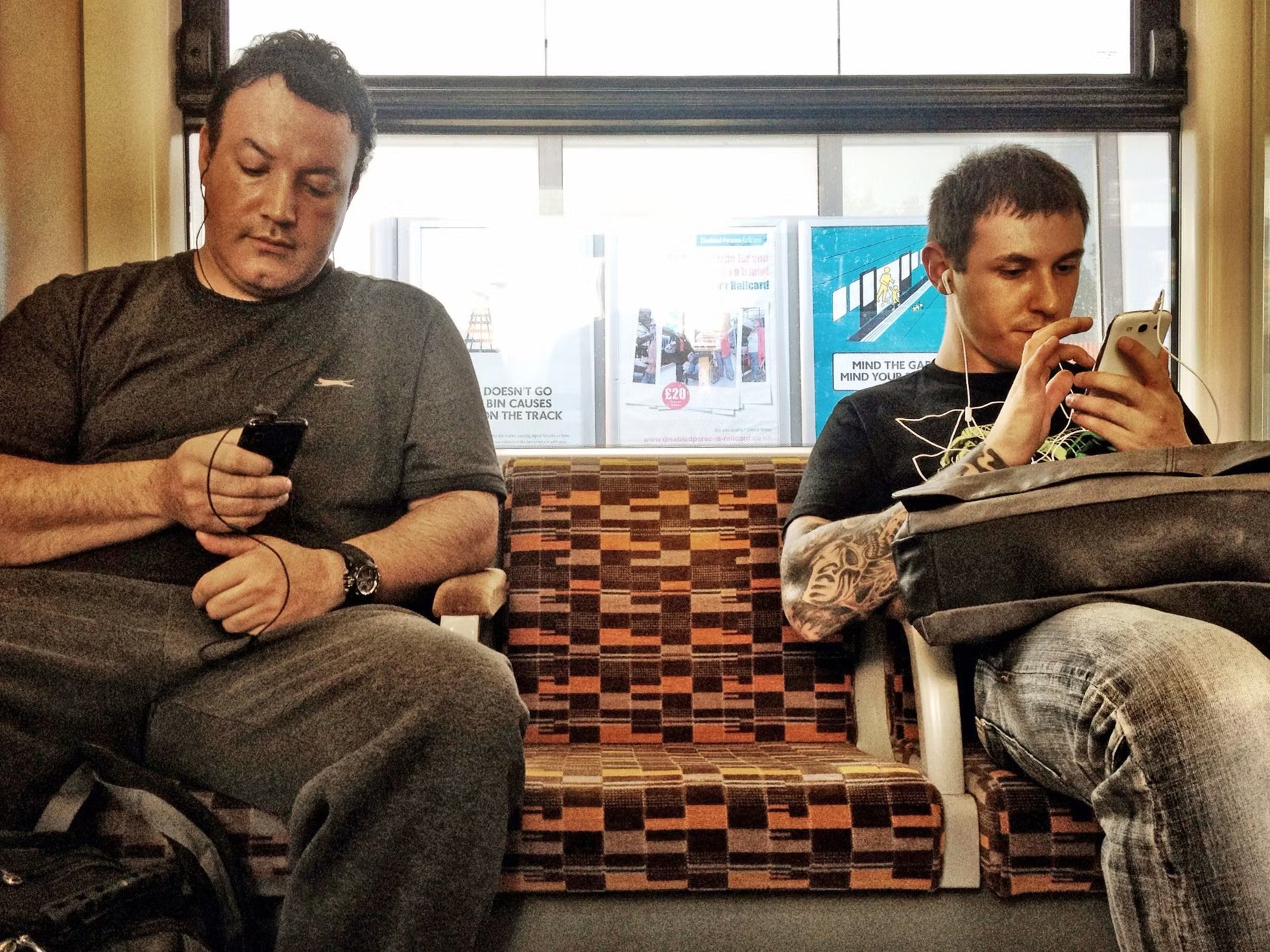Manspreading remains the most misunderstood of modern evils
As clips go viral of women ‘reclaiming space’ from spread-happy men on public transport, Ellie Muir asks if we need a new approach to one of the most provocative terms in modern social discourse


Your support helps us to tell the story
From reproductive rights to climate change to Big Tech, The Independent is on the ground when the story is developing. Whether it's investigating the financials of Elon Musk's pro-Trump PAC or producing our latest documentary, 'The A Word', which shines a light on the American women fighting for reproductive rights, we know how important it is to parse out the facts from the messaging.
At such a critical moment in US history, we need reporters on the ground. Your donation allows us to keep sending journalists to speak to both sides of the story.
The Independent is trusted by Americans across the entire political spectrum. And unlike many other quality news outlets, we choose not to lock Americans out of our reporting and analysis with paywalls. We believe quality journalism should be available to everyone, paid for by those who can afford it.
Your support makes all the difference.A week ago, 24-year-old Olivia found herself inside a “manspread sandwich”. Trapped between the muscular legs of the two men bookending her on the Tube, she pretzeled her limbs into a tiny ball. “I felt so small,” she tells me. “I didn’t notice their spreading until I lowered into the seat and accidentally nudged each of their knees as I sat down. The one on the left of me actually sank even lower into his seat – his knee bumped into my thigh. How can you be so rude? They must have known what they were doing, they just didn’t care.”
Discussion of manspreading – in which a man adopts a wide sitting position on public transport and encroaches on the person in the adjacent seat – sits at the murky intersection of debates about common courtesy and male privilege. The term was first used by the American newspaper AM New York in 2008, and was added to the Oxford English Dictionary in 2015, the years in between transforming it into one of the most provocative words in modern discourse.
It’s even been deemed to be so morally offensive that Madrid’s transport network issued a ban on manspreading in 2017, with the Empresa Municipal de Transportes rolling out signs asking passengers to refrain from taking up space by spreading their legs. Around the same time, Instagram accounts dedicated to capturing splayed stances on public transport began popping up across Europe. In France, @manspreadersofparis chronicled “Olympic-level spreaders”, while @manspread_dormunt in Germany and @manspreadersofnorway began showcasing everything from a humble V-shaped sprawl to men doing box splits.
Today, though, self-proclaimed manspread vigilantes have had enough. These people, who are typically outraged women, film strangers’ legs and widen their own in vengeful retaliation. “Always match his manspread!” writes one person in a recent TikTok video. “Put manspreaders in their place!” urges another. Each day, the internet seems to produce a viral clip documenting the plight of finding yourself next to a manspreader – or worse still, trapped between two.
One woman recently recorded her experience on a Ryanair flight from Cologne to Copenhagen, telling her TikTok followers that the manspread she was subjected to was “extreme”: “Stuck between two grown ass men on a Ryanair flight,” she said, while panning her camera onto the jean-clad thighs closing in on her. She tried to widen her legs and mimic her fellow traveller’s manspread, but he did not react. “Reclaim your space!” she angrily urged her followers.
At times, defences of manspreading do seem quite convincing. Some men point out that the seating layout on public transportation means that if they are taller, they have no choice but to manspread. The more far-fetched defences, however, suggest that men have an anatomical right to “let the balls breathe”. Full disclosure: if it is not abundantly clear by now, I do not have testicles. But I have seen men crossing their legs without appearing to be in excruciating pain, so I find it hard to believe that sitting like the rest of us could be a testicle-crushing or physically impossible activity.
I’m super conscious of what people think of me spreading my legs on the Tube, because I don’t want to be rude
There are some more reasonable excuses, though. Jack is 6ft 4in and has a difficult time fitting into seats on public transport. When he’s on buses, he’s forced to widen his legs because his knees won’t physically fit behind the seats. It’s different on the Tube, he tells me, as the two rows of seats facing each other allow him some more room. Still, he admits, it’s tempting to unleash his manspread.
“If I’m on the Tube and I’m just relaxing, my legs will slowly spread apart,” he says. “But in about two minutes I’ll realise I’m manspreading and quickly readjust. I’m super conscious of what people think of me spreading my legs on the Tube because I don’t want to be rude.” Jack – whom I’d class as a “self-aware manspreader” – does add that some men take manspreading to unnecessary extremes. “Some spread for their lives,” he says. “The train seats are too low for me, but you can just cross your legs instead. I do think some men aren’t comfortable with crossing their legs, so they do that thing where they cross one leg over the top.”
As users of public transport, we face many mundane etiquette conundrums each day, such as whether it’s morally acceptable to put your bag on the adjacent seat during rush hour, or if it’s OK to sit in someone’s designated seat on a train. Yet the critique of manspreading seems more impassioned because it’s embroiled in far more toxic conversations, namely debates about toxic masculinity – a term that refers to a set of male attitudes or behaviours that are seen as having a negative impact on society.
The criticisms of manspreading are, as the name suggests, wholly gendered, with the “alpha” or “audacious” tendencies of “toxic men” often spoken about in the same breath. But it’s worth noting that the term achieved peak popularity at a time when mainstream feminist discourse focused on the shortcomings of men, rather than on any kind of gender equality. You may remember the “manslamming” stunts of 2015, in which women went semi-viral on early Twitter by walking around busy cities and seeing how many men would “slam” into them if they didn’t move out of the way first. Refinery29 sent out a group of writers to get in men’s way for a week. They got battered around quite a bit, but the experiment still felt more vapid than revealing. Not only was the name “manslamming” absolutely awful – and very counterproductive to the cause – but it showed that continuously complaining about men rather than looking at the deeper complexities of their behaviour doesn’t get us very far.

Manspreading seems to reflect male privilege at its most mundane – the idea that men are permitted to occupy more space in public life, with women forced to slot in wherever and however they can. But we shouldn’t exclude the idea that people can merely be rude or inconsiderate without their gender coming into play. With that in mind, the manspreading debate is less an analysis of anatomy, patriarchy or gender (though they do come into it) than one of basic common courtesy. And a good place to start would be to make these boundaries universally clear.
Madrid’s authorities, I think, were on to something. There’s no universal rulebook for public transport etiquette, but if there was one, I’d suggest a good rule of thumb is that the knees go no wider than the shoulders. Speaking to our fellow passengers might also surprise us. Filming people’s crotches without their consent is never a good move, while quietly seething at someone is an opportunity lost for actual dialogue. Granted, it’s difficult to strike up a conversation with a stranger, especially when you’re at risk of causing them offence. But we have established a pretty thorough system with priority seats in the UK – I do not find it rude, for example, when someone asks me, a young, able-bodied woman, to give up my seat for them. Perhaps we could establish a similar code for personal space? “Hey, sorry, but please could you move over a tad, I’m a little squashed here.” It could go a long way. Or at least further than a TikTok trend.



Join our commenting forum
Join thought-provoking conversations, follow other Independent readers and see their replies
Comments